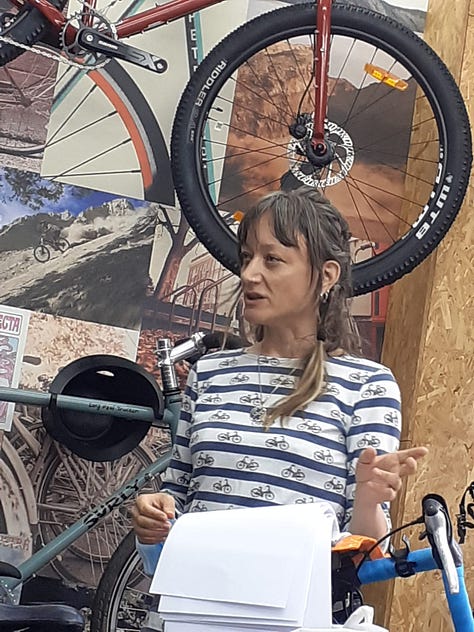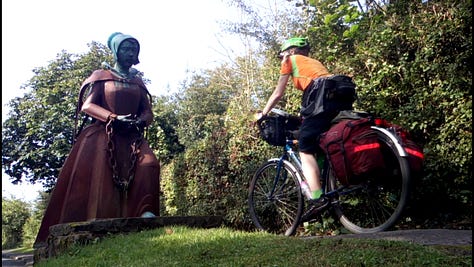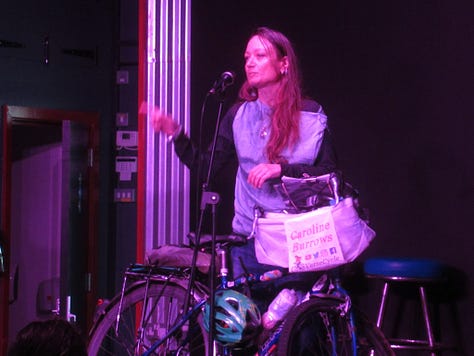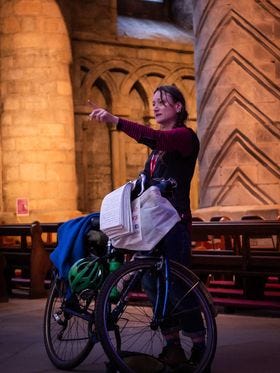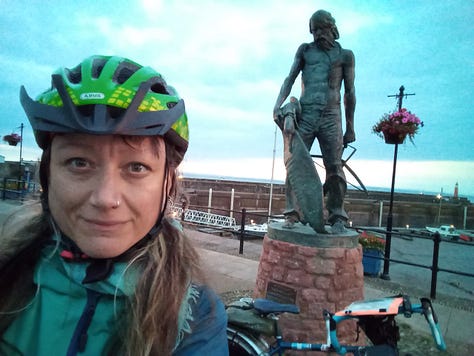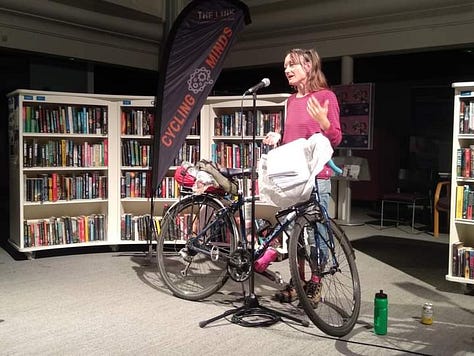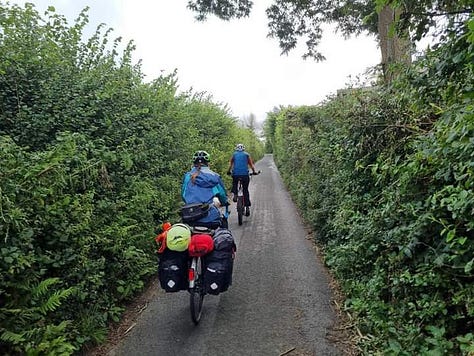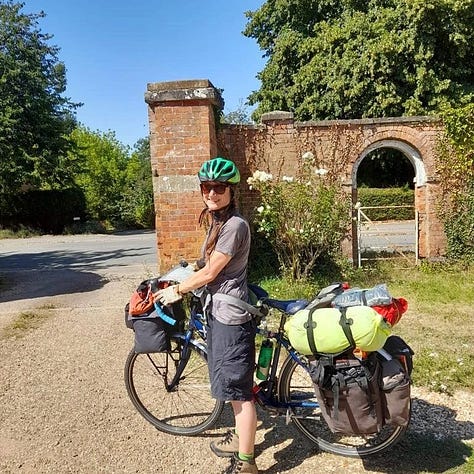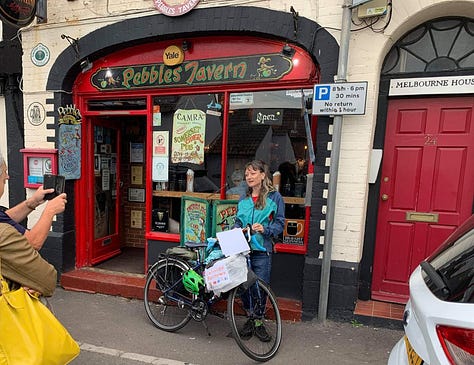Spokes of Inspiration from the Touring @VerseCycle Poet - Caroline Burrows
I’m a touring cycle poet, like an updated medieval bard on a steed with pedals and two wheels. I’ve never had a car out of choice. I choose to travel slowly so I can connect more with the people and locations in my surroundings which in turn influences the content of my poems. It also keeps me fit, helps manage my mental health, and reduces the negative environmental impact I have on my home planet, which I take seriously.
A desire to be greener had me writing a verse of poetry a day for a year in ‘It’s Not Easy Being Green’ where I looked at how to improve my own eco-habits. During lockdowns, I made that personal project into a social engagement one (before I knew the term ‘social engagement’ existed). I asked friends, zoom poets, and anyone showing a sliver of polite interest to record verses with me to make all 367 verses into videos. Those ended up being shortlisted for the Sustainability First Art Prize, and shown at Warrington Contemporary Arts Festival.
It’s Not Easy Being Green: Verse 230
In these disparate days of social distancing,
Friends and fellow writers are collaborating.
We’ve recorded ten verses of these rhymes,
Made a video to entertain with our time.
It’s not easy being green; I’m enjoying this new work paradigm.
Having those video poems in my portfolio resulted in poetry commissions for Glenside Hospital Museum/Bristol Ideas on another theme I feel strongly about: mental health.
To help manage my own mental health during the third lockdown, I began writing verses about my local area of Bristol, which got me out for short bike rides and developed a deeper appreciation of the city I called home. Those verses (180 in total) ended up on BBC Radio Bristol on Adam Crowther’s Upload show, then BBC Radio 4, and made into a short documentary ‘Bristol Bike Bard’ (directed by Dave MacFarlane/DM Two Media) which was officially selected for Kendal Mountain Film Festival.
Bristol Bike Bard: Verse 133: Cheers Drive, Speedwell. BS5.
There is a street in Bristol where local humour combines
With a phrase people say when getting off the bus,
Folks voted to name this street: ‘Cheers Drive’; one of life’s great signs.
Writing poetry is a niche activity, as is cycling, and combining the two is double niche. But all of the above proved to me I should continue writing about what I love. Others with similar interests, even if double-niche, appreciated what I was doing.
Also during lockdown, I was chosen for mentorship by the Handlebards, the Shakespearean Cycling Troupe, on their Gear Shift programme. I’d attended a few of their shows (Macbeth as a comedy is my absolute fave), and asked them about their bike and trailer set-ups, marvelling at their theatre company touring the country by bicycle. To be one of four chosen was an absolute dream, and I nearly wasn’t chosen because during one conversation Tom and Paul wondered why I needed any help. While it was true I had extensive cycle touring experience, I had none in putting on shows, contacting venues, or vocabulary like ‘ticket-split’ and ‘tour-pack.’ I was a teacher for nine years which had forced me to get used to standing up in front of difficult crowds, but when left to my own devices I prefer to sit in an attic room on my own writing. Their guidance gave me the courage and momentum to give my show a go, and addressed my worries about nobody turning up to see me. The advice was if that happened to treat it as valuable rehearsal time. Fortunately, people did come.
It's Not Easy Being Green: Verse 291
A Shakespearean theatre company,
‘The Handlebards’ tour on bikes with trailers,
Their webinar showed how they travel sustainably,
And encourage the same from their theatre-goers.
To be or not to be green; They’re go greener inspirers.
The first time I met Peter Roe, the mastermind behind the micro-publishing house The Jawbone Collective, he was part of the audience that came to see my Turning Pedals into Poems show. That was at the Phoenix in Exeter in August 2021, and hosted by local bard Tim King. I did a month-long bicycle tour around the West Country, not long after me and the nation had been double vaccinated against Covid. The ride to the Phoenix Arts Centre that night had been particularly wet, with my cycling shoes placed ‘off stage’ stuffed with newspaper to dry them out.
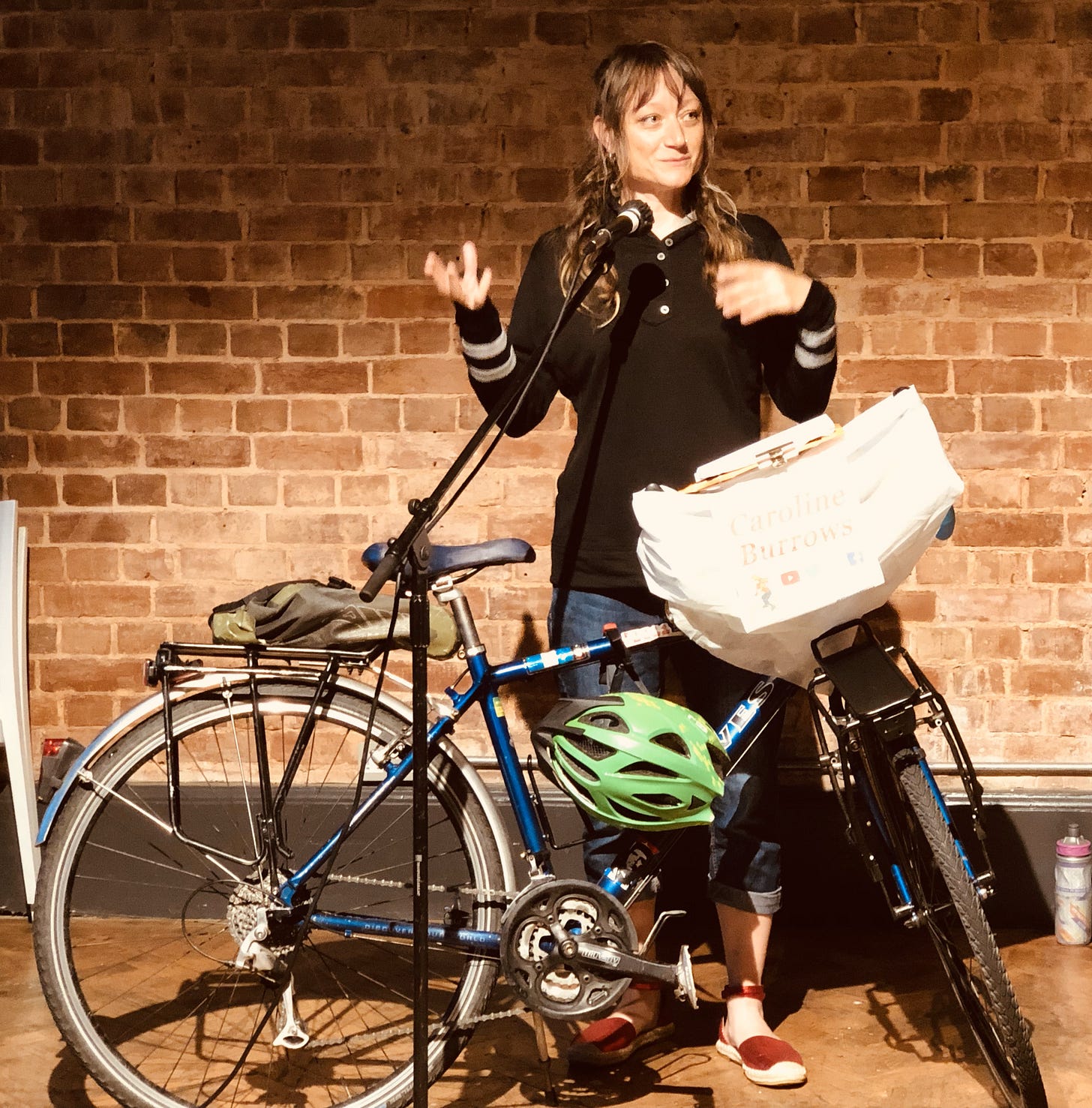
Post show at the bar, I chatted with Peter and other attendees. It was a wonderful introduction to poets and performers who lived even more South-West than me. Tim had set up the Phoenix’s regular Taking the Mic poetry night as a weekly Zoom session, and so once back in Bristol, I was able to stay in touch with them all and meet many more poets besides. On Monday mornings our talking heads still fill boxes on screens for Forsaking the Mic sessions.
I took my show on the road again in 2022, cycling the opposite way from Bristol to Berwick-upon-Tweed and a Bit Beyond over two months which stretched into three. As well as cycling, I tried expanding my eco self-sufficiency by carrying a set of fold-out solar panels to charge my electronics with. I’d looked into installing a dynamo on the bike but due to travelling at donkey-speed I wasn’t fast enough to charge anything.
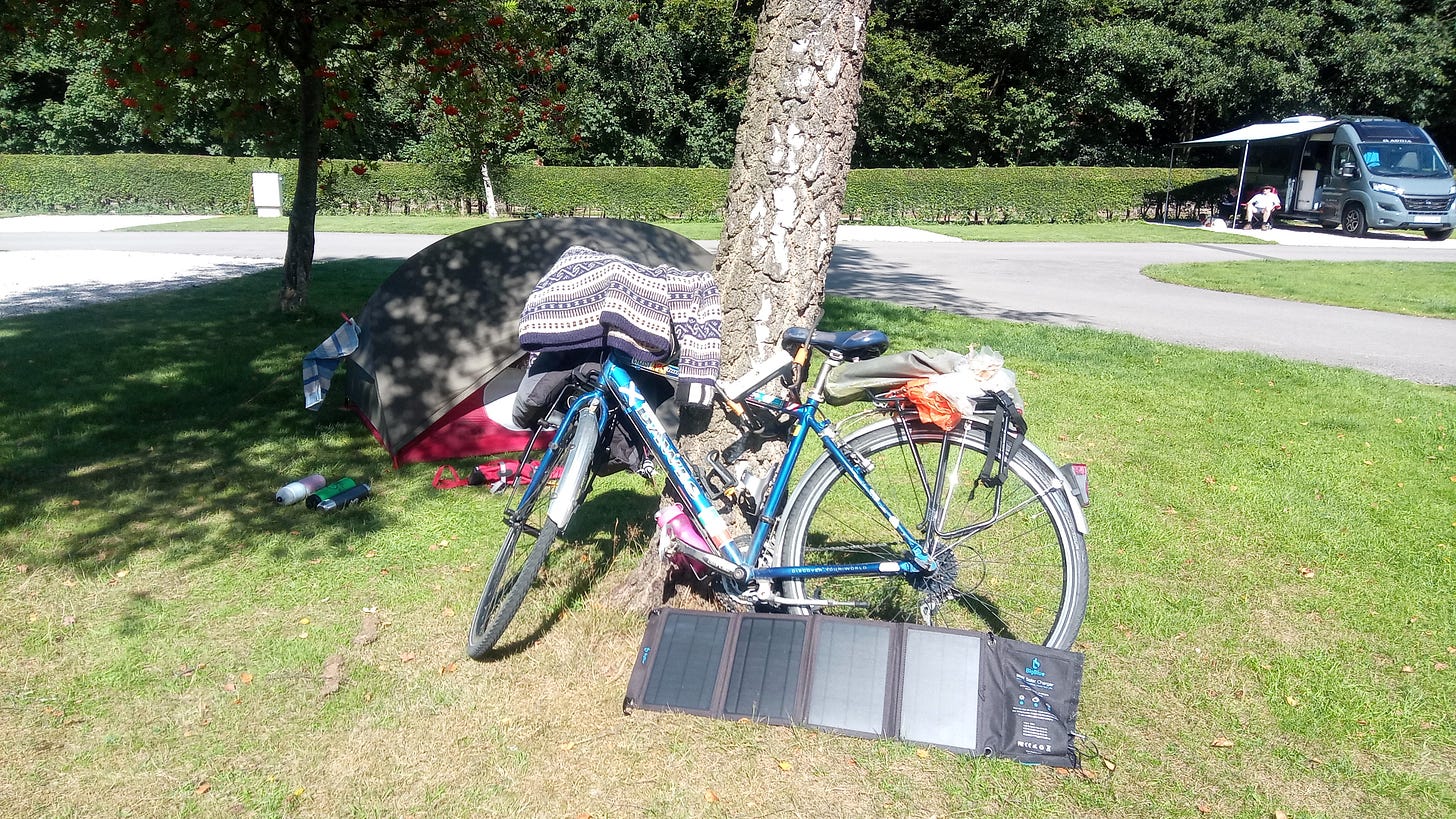
With help from the Handlebards, I applied for Arts Council Funding, but was unfortunately unsuccessful. Other arts institutions in the same boat have told me this is a badge of honour, and having often managed to do things my own way, I continued with a somewhat punk/rock inspired ethos. However, with rent prices ever-rising in Bristol that meant putting my possessions of mostly books, bicycle bits, and clothes into storage. I’d live out of my overladen panniers instead. It was on the road I met Peter again In-Real-Life.
I’d reached the Peak District. Solar power had waned due to that summer’s heatwave, which topped 40 degrees, mercifully ending, but replaced by torrents of rain. Climate change making mild British weather wilder was becoming more evident as I pedalled on mid-tour. I was also enduring my own metaphorical downpour from my inner-critic questioning my freedom based lack-of-security life choices.
Touring on a heavily laden bicycle, with ever increasing holes appearing in my ethically sourced merino wool jersey, repairing and reusing things wherever I could, was the more sustainable eco-friendly way to be. However, it was also more difficult, took longer which made it more expensive, and physically very tiring. But that’s the point. The system we live in has been set up to make more environmentally-friendly options more difficult, and that requires personal micro and systemic macro changes.
I sheltered in my tent, worrying about its hydrostatic rating, and wondering if a dinghy might be the best way to reach the bathroom block. That’s when I saw posts about official successfully funded eco poets and musicians who’d been enlisted by the UNFCCC (the ironically named United Nations Framework Convention on Climate Change). Five-hundred “thought leaders” were jetting from different locations to an Expo in Botswana for Global Adaption Week (https://unfccc.int/news/botswana-global-adaptation-week-2022 ). Their mission: to workshop ways to inspire in how to help the environment for the Resilience Frontiers initiative. Well, fumes not unlike the ones spewing out of trans-continental aircraft, and the more local-to-me cement works in Hope (there’s a lot of ironic nomenclature out there) must’ve been steaming out the top of my tent-poles. None of us, and I include myself, are perfect, and we can all keep trying to improve our own ways. However, perhaps step one to help achieve one of the project’s eight pathways of “lifelong learning for environmental stewardship” might be: don’t take unnecessary return flights to a country, which an expert from the same U.N. has since identified as producing only 0.2% of global greenhouse gas emissions, yet which has its already scarce water supply exacerbated by climate change. Nevertheless, I have indeed felt inspired to write some words, but perhaps not the ones outlined in their aims.
The next morning with a break in the rain clouds, a deus ex machina arrived on a chariot from Olympus, via Wessex. Peter messaged he was travelling through the Peak District and asked if he was anywhere near me. It turned out he was literally driving past my campsite, and as I walked out onto the main thoroughfare, there he be. We found a garden centre café where two rounds of coffee helped boost my confused and despondent mood; much needed with still half a tour to cycle.
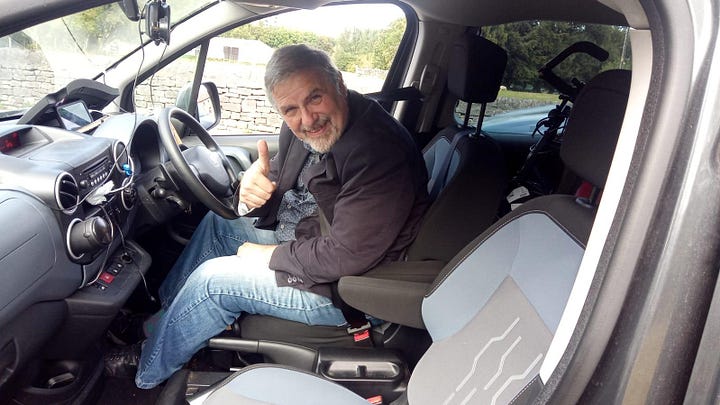
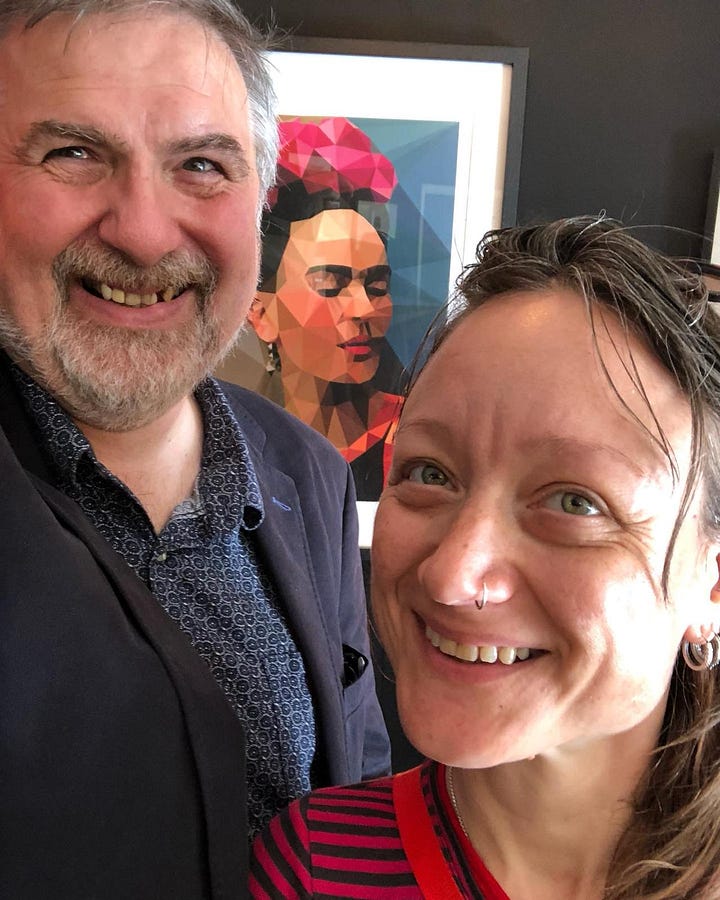
Peter spoke about The Jawbone Collective which he’d formed to help publish other poets’ first collections. He also asked if I was cycling over the iconic Winnat’s Pass, number 33 of the 100 Greatest Cycling Climbs. ‘Not likely,’ I said. I’d been avoiding as many hills as possible, somewhat futilely in the Peak District. But the seed had been planted, and Peter’s name was repeatedly spoken in vain, when a few days later I took my bike for an arduous walk up a pass so steep I couldn’t turn round to admire the view, lest I lose my grip on bikey. However, a few days after that was when the penny dropped, and I messaged to ask Peter if he’d meant he wanted to publish me. Yes was his reply. And yes, he used a Carbon Balanced printing company. And so, all was well again between us.
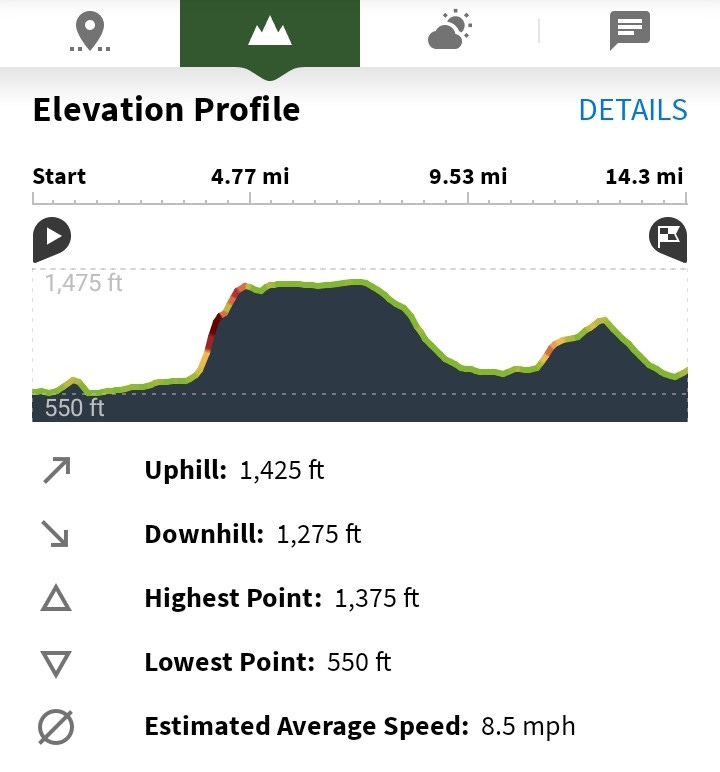
And despite not even being asked to refuse a long-haul flight so as to create words about climate change, I did get commissioned to write an eco-poem via phone calls and email by an organisation closer to home. I pulled over on the Hadrian’s Wall walker’s path on the way to Newcastle and recorded myself reading ‘A Sonnet for Triodos’. They’re an ethical bank based in Bristol which only invests in Green initiatives, and which I’d first found out about when writing my 367 eco verses.
It's Not Easy Being Green: Verse 320
My legs powered my bike up Quarry Road:
A relentless hill, it rose and rose,
On Caton Moor were eight wind turbines turning,
Clean electricity’s what they’re generating.
It’s not easy being green; An ethical bank, Triodos, gave them funding.
A Sonnet for Triodos: The Ethical Bank
(Shakespearean sonnet and acrostic)
The Earth breathed deeply beneath windy hills,
Rain clouds flew, water fell, a river grew.
In swam fish, exchanging air through their gills,
On the banks, trees laid roots, drank in the view.
Displaying branches of thanks, their leaves sent
Oxygen back to the sky, where birds lungs
Sang songs to the Sun, and on each day went.
Each of those who gathered heard the winds tongues
Teaching how to plant and grow energy.
Harvests from sunshine, air and water fed
Into homes which built a community.
Collectively they aimed, they looked ahead,
At ways to work with nature, they all strived,
Laid foundations, where they and the Earth thrived.
I do wrestle with thoughts about my own collection adding to all the stuff that already exists in the world, so if anyone knows of even greener ways to produce work and exist, I’d be really interested and excited in learning how to acheive that.
The longer, slower, less fanfare filled roads are the roads best travelled, and the more environmentally friendly ones.
